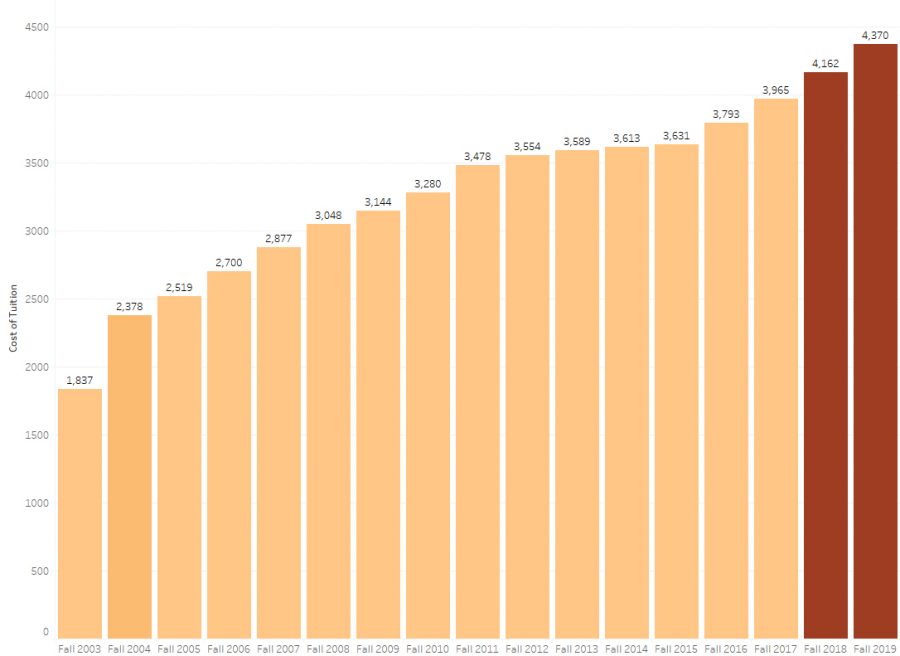For the first time, UTEP’s tuition will be partly based on which degree students will be pursuing.
And for most students, base tuition will be increasing by 5 percent for all students consecutively for two years, meaning a 10 percent total increase by 2019.
That means if a student is taking 15 credit hours, an undergraduate resident student can expect to see a $197 increase in fall of 2018 and an additional $208 increase in fall of 2019. Graduate students and nonresident students will also face a 10 percent total increase over two years.
Undergraduate students in the colleges of business, engineering, health sciences and nursing will see a differential increase with tuition rising anywhere from $210 to $502 depending on their major by fall 2019, in addition to the 10 percent increase.
“Those programs just cost more than they used to, and I mentioned that there are labs, equipment, microscopes, and all these kinds of things that cost a lot more in those programs than it would cost to teach a history major or an education major,” said Gary Edens, vice president of student affairs. “Basically they (students) were supplementing those who were in a high-cost program.”
Jocelyn Torres, a senior engineering major, will see a $240 increase as well as the $197 base increase.
“I get financial aid and I also get benefits with the military. It hasn’t been a problem, but I do still find myself getting loans out because school is expensive overall, so I feel like it’s just going to effect me more, especially since I have a year left,” Torres said.
While the business college does not use labs or high-tech equipment, the faculty are among the highest paid on campus, Edens said, since they bring in professors from the private sector, who can make a lot more money elsewhere.
“To bring a faculty member that has that business knowledge, that real-world knowledge, you’re bringing them from top firms, from top business opportunities,” Edens said.
Edens also said that UTEP changed to the differential tuition model to meet the continuously growing population as well.
“As we were a smaller campus and as we were building our research, I think that probably made sense, but as we’ve become a research-heavy institution, a tier-one institution, and as we’ve really seen growth in certain fields like engineering, business, health sciences, we’ve realized those programs just cost more than they used to,” Edens said.
Around 70 percent of the new revenue will go to faculty recruitment and retention, according to UTEP’s proposed tuition increase plan to the UT System.
The tuition increase will also go toward raises for faculty and staff, which were cut last year due to budget constraints, and ensuring that the teacher-to-student ratio does not increase as enrollment continues to break records. This past year UTEP has over 25,000 students in attendance.
“To stay competitive, we got to not only keep the great faculty we have, but continue to recruit outstanding faculty and that means we have to be competitive,” Edens said.
The remaining 30 percent will go toward student success initiatives, such as the UTEP Edge and student support, which includes anything from mental health counseling, disability services and advisors.
“Students overwhelmingly tell us that they want to have one-on-one relationships with their advisors and we really have to grow our pool of advisors,” Edens said.
Some state-mandated programs, such as sexual assault awareness, suicide prevention training and financial aid for military and civil servants, are not funded, so the tuition makes up for the lack of state funds.
Among the UT colleges in Texas, UTEP is still in the lower half of tuition costs. All UT colleges use differential tuition or are planning on doing so.
UTEP’s tuition has risen for years, increasing at a steady pace at around 9 to 10 percent every two years since 2013. Edens explained that as the state continues to not adequately fund schools, tuition will continue to rise.
“The reality is as we continue to see the state support of higher education go down as a percent of investment per student, we’re going to have to see that balance with some other increase,” Edens said. “So if the state is going to continue to support us less and less and less, then we’re going to have to make up those moneys, and the only way we can do that is through tuition.”
Students can find more information at utep.edu/tuition. To see the full proposed tuition increase, click here.










